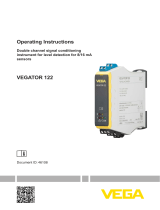
2
Contents
VEGASWING 63 • Relay (DPDT)
29229-EN-191123
Contents
1 About this document ............................................................................................................... 4
1.1 Function ........................................................................................................................... 4
1.2 Target group ..................................................................................................................... 4
1.3 Symbols used................................................................................................................... 4
2 For your safety ......................................................................................................................... 5
2.1 Authorised personnel ....................................................................................................... 5
2.2 Appropriate use ................................................................................................................ 5
2.3 Warning about incorrect use ............................................................................................. 5
2.4 General safety instructions ............................................................................................... 5
2.5 Safety label on the instrument .......................................................................................... 6
2.6 EU conformity ................................................................................................................... 6
2.7 SIL conformity .................................................................................................................. 6
2.8 Installation and operation in the USA and Canada ........................................................... 6
2.9 Safety instructions for Ex areas ........................................................................................ 6
2.10 Environmental instructions ............................................................................................... 6
3 Product description ................................................................................................................. 7
3.1 Conguration .................................................................................................................... 7
3.2 Principle of operation........................................................................................................ 8
3.3 Adjustment ....................................................................................................................... 8
3.4 Storage and transport....................................................................................................... 9
3.5 Accessories...................................................................................................................... 9
4 Mounting ................................................................................................................................. 11
4.1 General instructions ....................................................................................................... 11
4.2 Mounting instructions ..................................................................................................... 14
5 Connecting to power supply ................................................................................................. 17
5.1 Preparing the connection ............................................................................................... 17
5.2 Connection procedure .................................................................................................... 18
5.3 Wiring plan, single chamber housing.............................................................................. 18
6 Setup ....................................................................................................................................... 21
6.1 General information ........................................................................................................ 21
6.2 Adjustment elements ...................................................................................................... 21
6.3 Function table ................................................................................................................. 22
7 Maintenanceandfaultrectication ...................................................................................... 24
7.1 Maintenance .................................................................................................................. 24
7.2 Rectify faults ................................................................................................................... 24
7.3 Exchanging the electronics ............................................................................................ 25
7.4 How to proceed if a repair is necessary .......................................................................... 26
8 Dismount................................................................................................................................. 27
8.1 Dismounting steps.......................................................................................................... 27
8.2 Disposal ......................................................................................................................... 27
9 Supplement ............................................................................................................................ 28
9.1 Technical data ................................................................................................................ 28
9.2 Dimensions .................................................................................................................... 36
9.3 Industrial property rights ................................................................................................. 39
9.4 Trademark ...................................................................................................................... 39





















